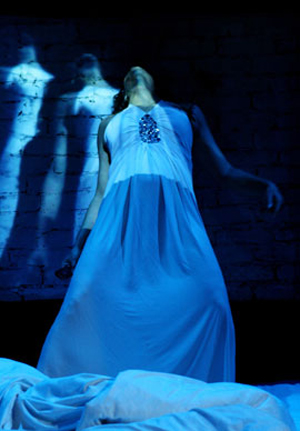A Lament for Medea

A lament for Medea
If you want to grab your audience’s attention, get them from the first moment. With actorish calm and posture the people who lead us down to the Arcola’s Studio 2 ask us to remove shoes and socks and wait outside.
In a corner by the entrance a woman chops onions and makes something that looks like ragu. She checks behind the curtain then comes back and, making eye contact with us one by one, leads each by the hand into the theatre space. She is spooky. I wonder if she is Medea, the woman who murdered her children.
The room she leads me into is calf-deep in water, it is fairly dark and the water is cold. Around my feet bob children’s toys, play swords and helmets.
No, she is not Medea, Medea sits slumped in a wheelchair at the end of the room. I am guided to a bench along the wall. I push a rubber piglet under and rest my feet on him while the others enter.
What follows is no narrative but a series of meditations on the myth of Medea.
The play is part of festival that deals with issues of women in migration and the action takes place in a life after life, a time without climax, after the infanticide, when “everything has been done”.
The act surrounds us as absurd as the abandoned paddling pool in which we sit. It is afterwards, too quiet to giggle, too dark to make eye contact.
The series of disorientations the audience experience – the cold water, the darkness and smoke, matches struck in our faces, the screaming woman – only contribute to the play’s intense interiority. We catch odd meanings, but overall you feel, it is not about us.
The experience is like sitting in a darkened flotation tank listening to someone’s scream, someone who is only occasionally aware that you are there. For anyone without the bare bones of the myth, the play makes no attempt to explain. Eventually it is hard to follow.
The avowed intention of the company is to “express something but not explicitly show”. Somehow, though, expression is not enough if we are to be moved. If it is to be more than spectacle, theatre must also communicate something, and here one has the feeling that what is being communicated is unwrought, unremarkable stuff.
Although the supporting cast is weak, Thelma Sharma is a convincing twinkly, slightly starched old maid, while the writer of the piece PJM is impressive in the lead role, scowling malevolently from her wheelchair as we enter and floating on her back before us as we leave.
With the hysterical central performance and the aggressive jerkiness of the supporting cast, the play hovers on the brink of absurdity. But the staging is tight, the atmosphere impressive, and at about 50 minutes, though impenetrable, it is hardly unendurable.
